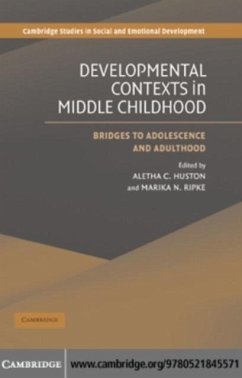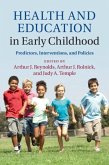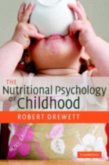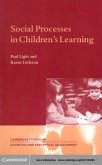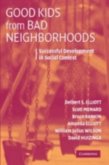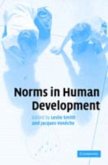Developmental Contexts in Middle Childhood (eBook, PDF)
Bridges to Adolescence and Adulthood
Redaktion: Huston, Aletha C.


Alle Infos zum eBook verschenken

Developmental Contexts in Middle Childhood (eBook, PDF)
Bridges to Adolescence and Adulthood
Redaktion: Huston, Aletha C.
- Format: PDF
- Merkliste
- Auf die Merkliste
- Bewerten Bewerten
- Teilen
- Produkt teilen
- Produkterinnerung
- Produkterinnerung

Hier können Sie sich einloggen

Bitte loggen Sie sich zunächst in Ihr Kundenkonto ein oder registrieren Sie sich bei bücher.de, um das eBook-Abo tolino select nutzen zu können.
During middle childhood, the period between ages 5 and 12, children gain the basic tools, skills and motivations to become productive members of their society. Failure to acquire these basic tools can lead to long-term consequences for children's future education, work and family life. In this book, first published in 2006, the editors assemble contributions from fifteen longitudinal studies representing diverse groups in the United States, Canada, New Zealand and the United Kingdom to learn what developmental patterns and experiences in middle childhood contexts forecast the directions…mehr
- Geräte: PC
- mit Kopierschutz
- eBook Hilfe
- Größe: 2.41MB
- FamilySharing(5)
![Health and Education in Early Childhood (eBook, PDF) Health and Education in Early Childhood (eBook, PDF)]() Health and Education in Early Childhood (eBook, PDF)29,95 €
Health and Education in Early Childhood (eBook, PDF)29,95 €![Cognitive Developmental Change (eBook, PDF) Cognitive Developmental Change (eBook, PDF)]() Cognitive Developmental Change (eBook, PDF)29,95 €
Cognitive Developmental Change (eBook, PDF)29,95 €![Nutritional Psychology of Childhood (eBook, PDF) Nutritional Psychology of Childhood (eBook, PDF)]() Robert DrewettNutritional Psychology of Childhood (eBook, PDF)34,95 €
Robert DrewettNutritional Psychology of Childhood (eBook, PDF)34,95 €![Social Processes in Children's Learning (eBook, PDF) Social Processes in Children's Learning (eBook, PDF)]() Paul LightSocial Processes in Children's Learning (eBook, PDF)29,95 €
Paul LightSocial Processes in Children's Learning (eBook, PDF)29,95 €![Risk and Resilience (eBook, PDF) Risk and Resilience (eBook, PDF)]() Ingrid SchoonRisk and Resilience (eBook, PDF)34,95 €
Ingrid SchoonRisk and Resilience (eBook, PDF)34,95 €![Good Kids from Bad Neighborhoods (eBook, PDF) Good Kids from Bad Neighborhoods (eBook, PDF)]() Delbert S. ElliottGood Kids from Bad Neighborhoods (eBook, PDF)39,95 €
Delbert S. ElliottGood Kids from Bad Neighborhoods (eBook, PDF)39,95 €![Norms in Human Development (eBook, PDF) Norms in Human Development (eBook, PDF)]() Norms in Human Development (eBook, PDF)25,95 €
Norms in Human Development (eBook, PDF)25,95 €-
-
-
Dieser Download kann aus rechtlichen Gründen nur mit Rechnungsadresse in A, B, BG, CY, CZ, D, DK, EW, E, FIN, F, GR, HR, H, IRL, I, LT, L, LR, M, NL, PL, P, R, S, SLO, SK ausgeliefert werden.
- Produktdetails
- Verlag: Cambridge University Press
- Erscheinungstermin: 12. Juni 2006
- Englisch
- ISBN-13: 9780511144912
- Artikelnr.: 38194686
- Verlag: Cambridge University Press
- Erscheinungstermin: 12. Juni 2006
- Englisch
- ISBN-13: 9780511144912
- Artikelnr.: 38194686
- Herstellerkennzeichnung Die Herstellerinformationen sind derzeit nicht verfügbar.
Marika N. Ripke is the Director of Hawaii Kids Count and an Affiliate Faculty member of the Center on the Family at the University of Hawaii at Manoa. Her research specializes on the effects of poverty on children and the impact of out of school activities on child and youth development. As Director of Hawaii Kids Count, she assesses (and advocates for) the well-being of Hawaii's children and families by tracking various health, economic, and educational indicators over time. She currently directs the data collection and analysis of a study examining the quality and availability of education and health supports for Native Hawaiian families and their young children. She holds a governmental position as a voting member of the State of Hawaii's Commission on Fatherhood. She has co-authored articles in such scholarly journals as Developmental Psychology, Review of Research in Education, New Directions in Youth Development, and Handbook of Child Psychology.
of development Aletha C. Huston and Marika N. Ripke; 2. The significance of
middle childhood peer competence for work and relationships in early
adulthood W. Andrew Collins and Manfred van Dulmen; 3. Aggression and
insecurity in late adolescent romantic relationships: antecedents and
developmental pathways Gregory S. Pettit, John E. Bates, Amy
Holtzworth-Munroe, Amy D. Marshall, Lori D. Harach, David J. Cleary and
Kenneth A. Dodge; 4. Middle childhood family-contextual and personal
factors as predictors of adult outcomes L. Rowell Huesmann, Eric F. Dubow,
Leonard D. Eron and Paul Boxer; 5. Genetic and environmental influences on
continuity and change in reading achievement in the Colorado Adoption
Project Sally J. Wadsworth, Robin Corley, Robert Plomin, John K. Hewitt and
John C. DeFries; 6. Reciprocal effects of mothers' depression and
children's problem behaviors from middle childhood to early adolescence
Sara R. Jaffee and Richie Poulton; 7. Middle childhood life course
trajectories: links between family dysfunction and children's behavioral
development Linda S. Pagani, Christa Japel, Alain Girard, Abdeljelil
Farhat, Sylvana Côté and Richard E. Tremblay; 8. The contribution of middle
childhood contexts to adolescent achievement and behavior Katherine
Magnuson, Greg J. Duncan and Ariel Kalil; 9. Educational tracking within
and between schools: from first grade through middle school and beyond
Doris R. Entwisle, Karl L. Alexander and Linda Steffel Olson; 10. School
environments and the diverging pathways of students living in poverty Penny
Hauser-Cram, Marji Erickson Warfield, Jennifer Stadler and Selcuk R. Sirin;
11. The relations of classroom contexts in the early elementary years to
children's classroom and social behavior NICHD Early Child Care Research
Network; 12. Out-of-school time use during middle childhood in a low-income
sample: do combinations of activities affect achievement and behavior?
Pamela Morris and Ariel Kalil; 13. Low-income children's activity
participation as a predictor of psychosocial and academic outcomes in
middle childhood and adolescence Marika N. Ripke, Aletha C. Huston and
David M. Casey; 14. Healthy mind, healthy habits: the influence of activity
involvement in middle childhood Sandra D. Simpkins, Jennifer A. Fredricks,
Pamela E. Davis-Kean and Jacquelynne S. Eccles; 15. Media effects in middle
childhood L. Rowell Huesmann and Laramie D. Taylor; 16. Continuity and
discontinuity in middle childhood: implications for adult outcomes in the
UK 1970 birth cohort Leon Feinstein and John Bynner; 17. Mandatory
welfare-to-work programs and preschool-age children: do impacts persist
into middle childhood? Sharon M. McGroder, Martha J. Zaslow, Kristin A.
Moore and Jennifer L. Brooks; 18. Effects of welfare and employment
policies on middle-childhood school performance: do they vary by
race/ethnicity, and if so, why? Hirokazu Yoshikawa, Pamela Morris, Lisa
Gennetian, Amanda L. Roy, Anna Gassman-Pines and Erin B. Godfrey; 19.
Effects of a family poverty intervention program lasting from middle
childhood to adolescence Aletha C. Huston, Sylvia R. Epps, Mi Suk Shim,
Greg J. Duncan, Danielle A. Crosby and Marika N. Ripke; 20. Experiences in
middle childhood and children's development: a summary and integration of
research Aletha C. Huston and Marika N. Ripke.
of development Aletha C. Huston and Marika N. Ripke; 2. The significance of
middle childhood peer competence for work and relationships in early
adulthood W. Andrew Collins and Manfred van Dulmen; 3. Aggression and
insecurity in late adolescent romantic relationships: antecedents and
developmental pathways Gregory S. Pettit, John E. Bates, Amy
Holtzworth-Munroe, Amy D. Marshall, Lori D. Harach, David J. Cleary and
Kenneth A. Dodge; 4. Middle childhood family-contextual and personal
factors as predictors of adult outcomes L. Rowell Huesmann, Eric F. Dubow,
Leonard D. Eron and Paul Boxer; 5. Genetic and environmental influences on
continuity and change in reading achievement in the Colorado Adoption
Project Sally J. Wadsworth, Robin Corley, Robert Plomin, John K. Hewitt and
John C. DeFries; 6. Reciprocal effects of mothers' depression and
children's problem behaviors from middle childhood to early adolescence
Sara R. Jaffee and Richie Poulton; 7. Middle childhood life course
trajectories: links between family dysfunction and children's behavioral
development Linda S. Pagani, Christa Japel, Alain Girard, Abdeljelil
Farhat, Sylvana Côté and Richard E. Tremblay; 8. The contribution of middle
childhood contexts to adolescent achievement and behavior Katherine
Magnuson, Greg J. Duncan and Ariel Kalil; 9. Educational tracking within
and between schools: from first grade through middle school and beyond
Doris R. Entwisle, Karl L. Alexander and Linda Steffel Olson; 10. School
environments and the diverging pathways of students living in poverty Penny
Hauser-Cram, Marji Erickson Warfield, Jennifer Stadler and Selcuk R. Sirin;
11. The relations of classroom contexts in the early elementary years to
children's classroom and social behavior NICHD Early Child Care Research
Network; 12. Out-of-school time use during middle childhood in a low-income
sample: do combinations of activities affect achievement and behavior?
Pamela Morris and Ariel Kalil; 13. Low-income children's activity
participation as a predictor of psychosocial and academic outcomes in
middle childhood and adolescence Marika N. Ripke, Aletha C. Huston and
David M. Casey; 14. Healthy mind, healthy habits: the influence of activity
involvement in middle childhood Sandra D. Simpkins, Jennifer A. Fredricks,
Pamela E. Davis-Kean and Jacquelynne S. Eccles; 15. Media effects in middle
childhood L. Rowell Huesmann and Laramie D. Taylor; 16. Continuity and
discontinuity in middle childhood: implications for adult outcomes in the
UK 1970 birth cohort Leon Feinstein and John Bynner; 17. Mandatory
welfare-to-work programs and preschool-age children: do impacts persist
into middle childhood? Sharon M. McGroder, Martha J. Zaslow, Kristin A.
Moore and Jennifer L. Brooks; 18. Effects of welfare and employment
policies on middle-childhood school performance: do they vary by
race/ethnicity, and if so, why? Hirokazu Yoshikawa, Pamela Morris, Lisa
Gennetian, Amanda L. Roy, Anna Gassman-Pines and Erin B. Godfrey; 19.
Effects of a family poverty intervention program lasting from middle
childhood to adolescence Aletha C. Huston, Sylvia R. Epps, Mi Suk Shim,
Greg J. Duncan, Danielle A. Crosby and Marika N. Ripke; 20. Experiences in
middle childhood and children's development: a summary and integration of
research Aletha C. Huston and Marika N. Ripke.
